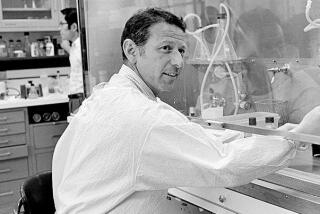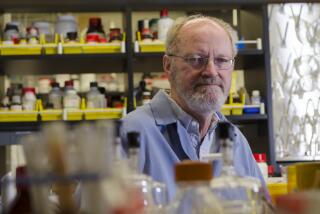William S. Knowles dies at 95; Nobel Prize-winning chemist

Notable deaths of 2012 (Ron Frehm / Associated Press)

Notable deaths of 2012 (David Longstreath / Associated Press)

Notable deaths of 2012 (Chris Pizzello / Associated Press)

Notable deaths of 2012 (John Duricka / Associated Press)

Notable deaths of 2012 (Lucy Pemoni / Associated Press)

Notable deaths of 2012 (Don Bartletti / Los Angeles Times)

Notable deaths of 2012 (Victoria Will / Associated Press)

Notable deaths of 2012 (Andre Luiz / Associated Press)

Notable deaths of 2012 (Ron Edmonds / Associated Press)

Notable deaths of 2012 (Tony Gutierrez / Associated Press)

Notable deaths of 2012 (Charles Rex Abrogast / Associated Press)

Notable deaths of 2012 (Jennifer S. Altman / For The Times)

Notable deaths of 2012 (Genaro Molina / Los Angeles Times)

Notable deaths of 2012 (Elizabeth Conley / Associated Press)

Notable deaths of 2012 (Eric Gay / Associated Press)

Notable deaths of 2012 (Jim Mone / Associated Press)

Notable deaths of 2012 (Walt Zeboski / Associated Press)

Notable deaths of 2012 (David Van Der Veen / AFP / Getty Images)

Notable deaths of 2012 (Matthew Cavanaugh / EPA)

Notable deaths of 2012 (Ray Howard / Associated Press)

With his silky voice and and casual style, the baritone most famous for his rendition of âMoon Riverâ was one of Americaâs top vocalists from the 1950s into the 1970s. He was 84. Full obituary
Notable deaths of 2012

Notable deaths of 2012 (Carlo Allegri / Associated Press)

Notable deaths of 2012 (John Marshall Mantel / Associated Press)

Notable deaths of 2012 (Gary Friedman / Los Angeles Times)

Notable deaths of 2012 (Gus Ruelas / Associated Press)

Notable deaths of 2012 (Santi Visalli / Getty Images)

Notable deaths of 2012 (Ken Hively / Los Angeles Times)

Notable deaths of 2012 (Carolyn Cole / Los Angeles Times)

Notable deaths of 2012 (Genaro Molina / Los Angeles Times)

Notable deaths of 2012 (Jim Hollander / EPA)

Notable deaths of 2012 (Charles Sykes / Associated Press)

Notable deaths of 2012 (Bebeto Matthews / Associated Press)

Notable deaths of 2012 (Jay L. Clendenin / Los Angeles Times)

Notable deaths of 2012 (George Wilhelm / Los Angeles Times)

Notable deaths of 2012 (Diether Endlicher / Associated Press)

Notable deaths of 2012 (Hassan Ammar / Associated Press)

Notable deaths of 2012 (Ed Rode / Associated Press)

Notable deaths of 2012 (Nati Harnik / Associated Press)

Notable deaths of 2012 (Alexander Joe / AFP / Getty Images)

Notable deaths of 2012 (Olivier Ferrand / Capitol Records)

Notable deaths of 2012 (Gary Friedman / Los Angeles Times)

Notable deaths of 2012 (Jakub Mosur / For The Times)

Notable deaths of 2011 (Frazer Harrison / Getty Images)

Notable deaths of 2011 (Al Messerschmidt / Getty Images)

Notable deaths of 2011 (Jae C. Hong / Associated Press)
William S. Knowles, a retired Monsanto Co. organic chemist who shared a Nobel Prize in 2001 for helping to solve a vexing problem in the manufacture of medicines, died Wednesday of complications of ALS at his home in the St. Louis suburb of Chesterfield, Mo. He was 95.
Knowles shared the 2001 Nobel Prize in chemistry with two other scientists, K. Barry Sharpless of the Scripps Research Institute in La Jolla and Ryoji Noyori of Nagoya University in Japan, for work he started three decades earlier during a career at Monsanto that stretched from 1942 to 1986.
From 1968 to 1972, Knowles led development of a chemical catalyst to create safe compounds for producing L-Dopa, a drug for treating Parkinsonâs disease. (Catalysts are used to create reactions in other molecules.) Sharpless later expanded Knowlesâ process to produce beta blockers used in treating heart conditions, anti-inflammatory medicines and many other pharmaceuticals.
Knowlesâ work concerned a problem of long standing in organic chemistry. Some molecules exist in two mirror-image forms, called chiral forms, that can have markedly different and dangerous effects. One example was thalidomide, a drug developed in the 1950s to ease nausea in pregnant women. It did, but it also caused deformities in thousands of infants.
Knowlesâ group at Monsanto developed a way to safely remove the dangerous molecular forms. Over the next decade, Noyori redesigned the catalyst to expand its use, and Sharpless further refined it to make it apply to almost all molecules.
Knowles was born June 1, 1917, in Taunton, Mass., a son of the owner of a textile mill in nearby New Bedford, Mass. He graduated from Harvard College in 1939 with a bachelorâs in chemistry, then earned a doctorate in chemistry at Columbia University in 1942.
He began working for Monsanto in Dayton, Ohio, before moving to company headquarters in St. Louis. During World War II he worked on military projects including the manufacturing of chemicals for explosives and insecticides for servicemenâs uniforms.
He was 84 when the Royal Swedish Academy of Sciences in Stockholm informed him of his Nobel Prize. âI never even thought such a thing was in the offing,â he said.
Knowles was a dedicated outdoorsman and bicyclist. He and his wife, Nancy, spent many summers at their second home near Jackson Hole, Wyo. The couple have willed their farm overlooking the Missouri River near St. Charles. Mo., to a local parks department.
Besides his wife, whom he married in 1945, Knowles is survived by daughters Sarah Knowles of Seattle, Elizabeth Knowles of New York and Lesley McIntire of Kirkwood, Mo.; son Peter of Seattle; and four grandchildren.
OâNeil writes for the St. Louis Post-Dispatch and McClatchy Newspapers.






